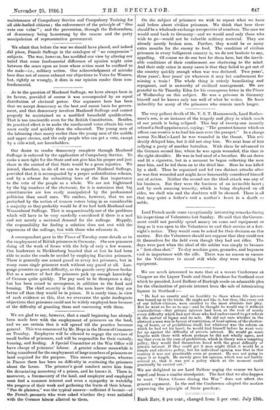We are glad to say, however, that a small beginning
has already been made here with the employment of _prisoners on the land, and we are certain that it will spread till the practice becomes general. This was announced by Mr. Hope in the House of Commons on Tuesday. Employers will be allowed to engage the services of small bodies of prisoners, and will be responsible for their custody, housing, and feeding. A Special Committee at the War Office will have charge of prisoners' labour. A greater scheme meanwhile is being considered for the employment of large numbers of prisoners on land acquired for the purpose. This means segregation, whereas in France there has been no difficulty in scattering the prisoners about the farms. The prisoner's good conduct saves him from the devastating monotony of a prison, and he knows it. There moreover, a freemasonry of the land, and employer and employed soon find a common interest and even a sympathy in watehihg the progress of their work and gathering- the fruits of their labour. "Pas de plaintes," was the typical answer—sufficient if /aconic-0 the French ,peasants who were asked whether they were satisfied with the German labour allotted to them. On the subject of prisoners we wish to repeat what we have said before about civilian prisoners. We think that here there should be a wholesale exchange irrespective of numbers. The men we would send back to Germany—and we would send only those who wish-to go—would not be valuable military material. They are already mostly broken men. Further, they would be so many extra mouths for the enemy to feed. The condition of civilian prisoners in every belligerent country is, we do not hesitate to say, appalling. Of course we do our best for them here, but the inevit- able conditions of their confinement are shattering to the mind. And their only crime in many cases is that they failed to get out of the country quickly enough when war was declared. Two years', three years', four years' (or whatever it may be) confinement for missing a train ! The whole thing is utterly humiliating and repugnant, and is unworthy of civilized management. We are grateful to Sir Timothy Eden for his courageous letter in the Times of Wednesday on this subject. He was a prisoner in Germany himself and he knows only too well of what he writes. He fears imbecility for many of the prisoners who remain much longer.


































 Previous page
Previous page